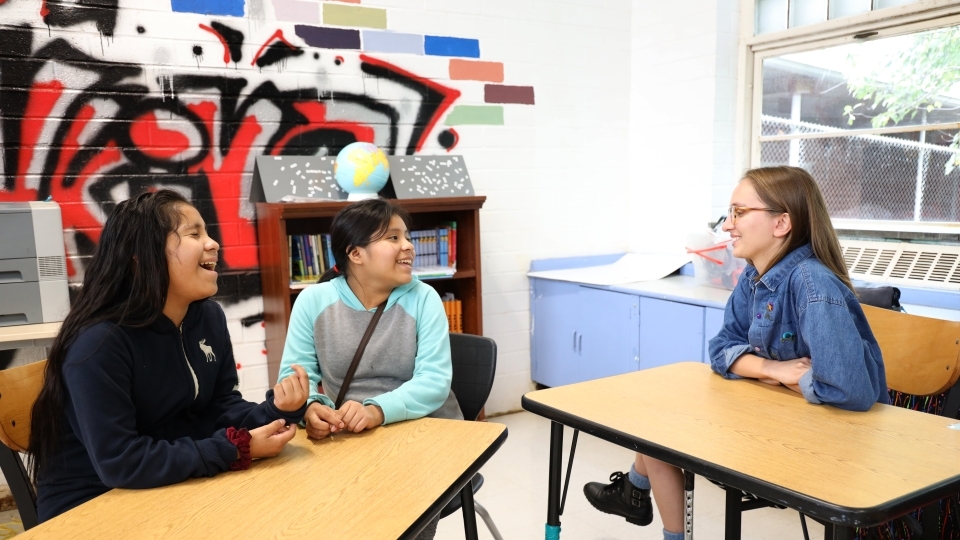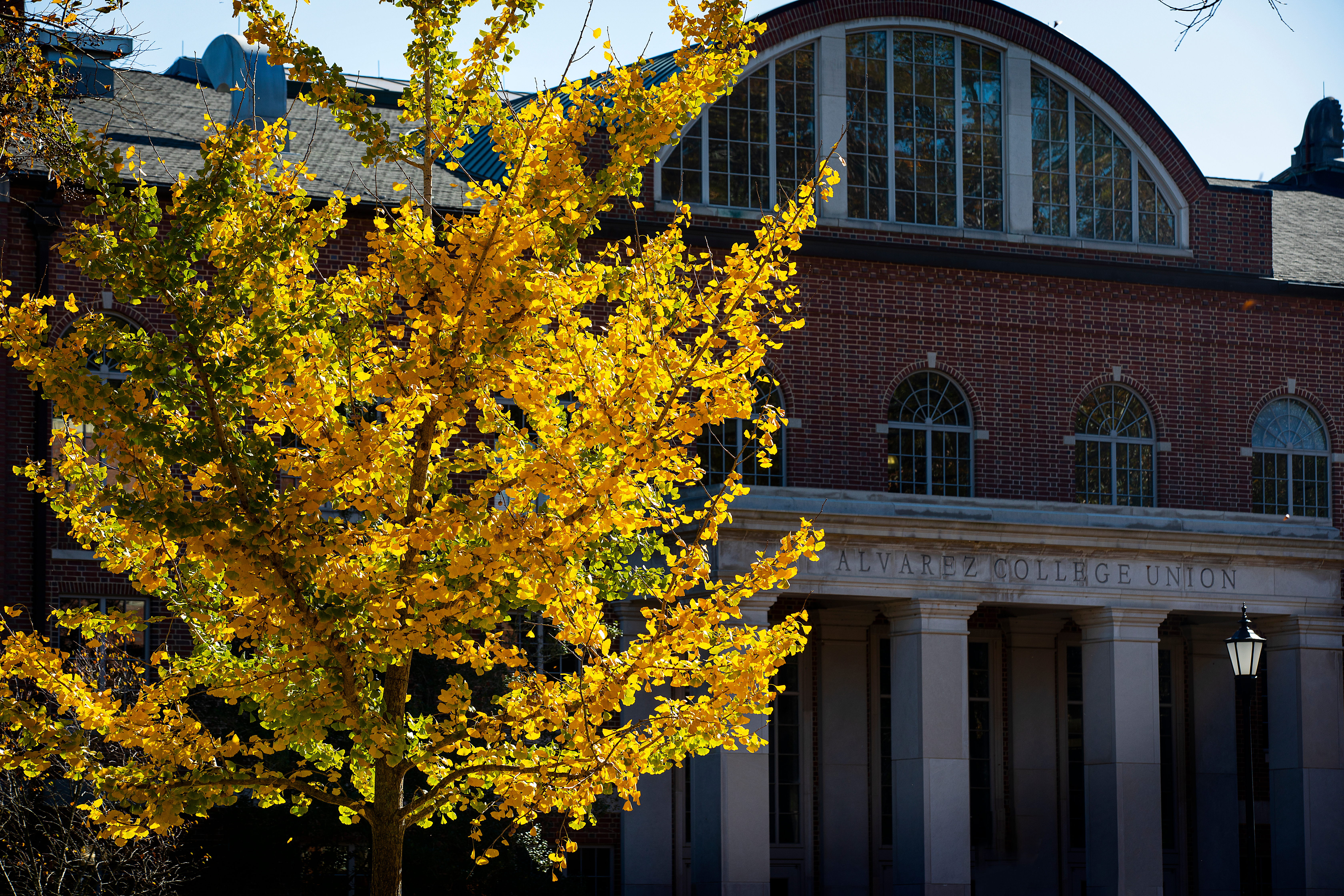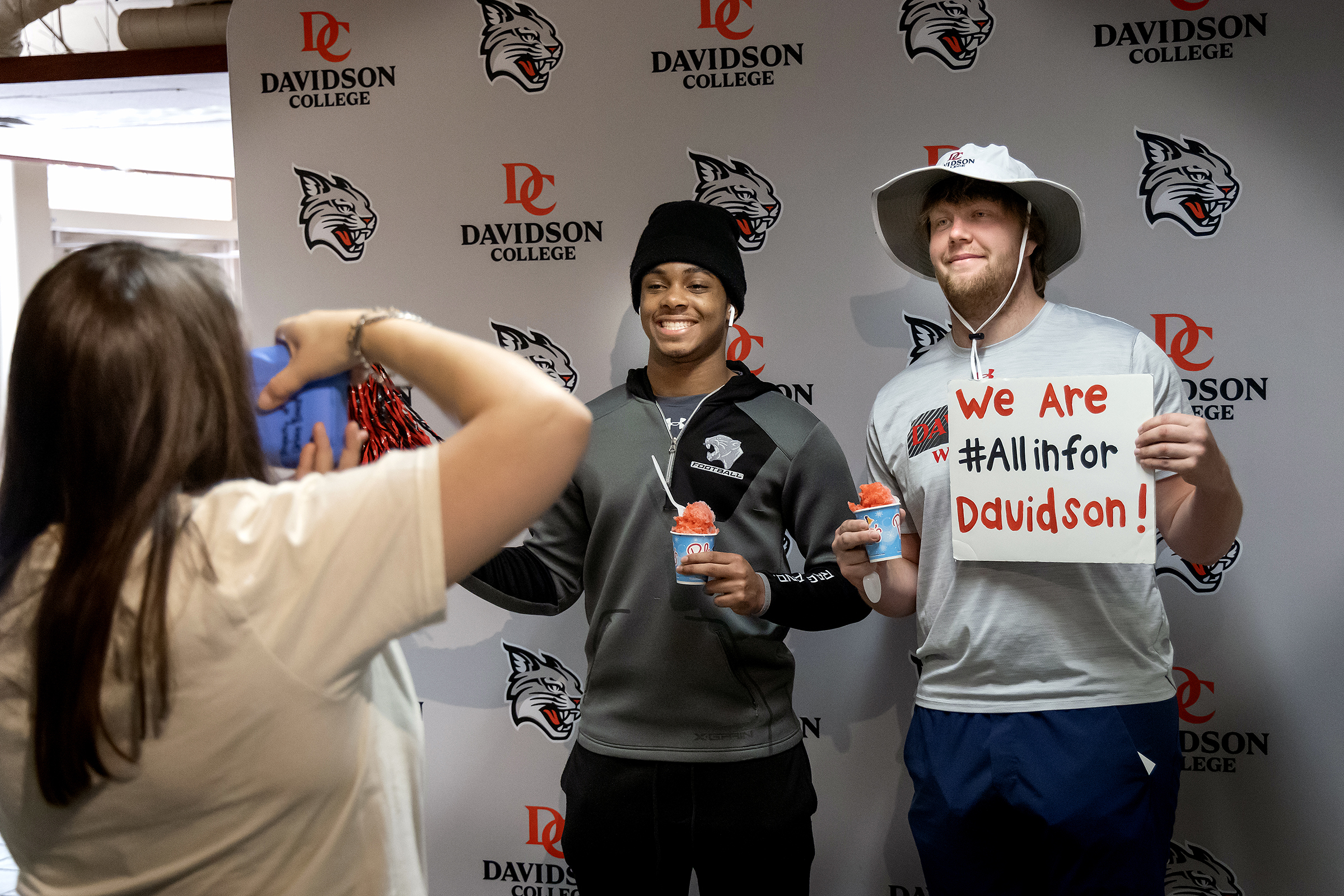By Kids, for Kids: Local Hero Inspires New Book, New Generation
October 16, 2019
- Author
- Mary Elizabeth DeAngelis

Kenzie Bell ’20 aspires to become an educator. Young authors Katie and Kelly Olguin are among the 12 students Bell worked with to write a children’s book about Ada Jenkins, whose tireless efforts led to the construction of a new school for the town’s black children during the time of segregation.
It started as a heroes of history project.
On Friday afternoons, Kenzie Bell’s students in the Ada Jenkins Center’s after-school program would learn about people who changed history, and then create posters to hang on the classroom wall.
Martin Luther King Jr. Rosa Parks. Helen Keller. Ada Jenkins.
“Wait, she was a real person?” one of the kids asked.
That question got Bell thinking about Jenkins, a teacher whose passion to help children overcome obstacles nearly a century ago remains a core value of the community center that bears her name.
What better way to honor Jenkins and teach history, she thought, then to have the children tell her story? So Bell, from Davidson College’s class of 2020, decided she and her students would write a book.
Mrs. Ada Jenkins and the Davidson Colored School is a children’s book written and illustrated by fourth and fifth graders Bell has taught in the LEARN Works program. It tells the story of how Jenkins, an African American teacher, rallied her community to build a new school.
“There once was a woman named Ada Jenkins,” the book begins. “She was a superhero in her community.”
The book starts in the 1930s, when racial segregation was law. Separate clearly was not equal. The black children attended an old, leaky, overcrowded school. White children went to a newer, nicer, bigger school.
At the Davidson Colored School, the book says, “Students were packed into the classrooms like pickles in a jar.”
Let’s stop right now and talk about a writer’s process, because this is a true literary moment.
Bell had asked the students to come up with a simile or metaphor to describe a small, packed room full of children.
As 11-year-old author Katie Olguin tells it, this image came to her:
“I was hungry, and thinking about someone who had a pickle that kind of exploded when she opened her lunch, and that reminded me of going to Food Lion with my mom and seeing all those pickles just stuffed into a jar on the shelf,” she said.
Food plays an important role in the story. Jenkins and others raised money for the school by selling hotdogs, hamburgers and ice cream. Volunteers then built the school, partly with bricks from an old Davidson College building.
Educator at Heart
Bell, from Asheville, North Carolina, started at the Ada Jenkins Center through a work study program with Davidson’s Center for Civic Engagement. As a first-year student, she worked there two days a week, then ended up going after school many others as a volunteer.
“I really fell in love with the kids,” she said.
The experience caused her to change her major from public policy to education and community studies. When plans for a semester abroad fell through last year, she got a job teaching fourth and fifth graders in the after-school program.
Bell understands what it’s like to struggle with writing: At three, she was diagnosed with hearing loss and spent her elementary school years playing catch up through tutoring and speech therapy.
"I remember how frustrating it was to always feel behind, and to need to be pulled out of class,” Bell said. “I understand how my students feel in their regular day-to-day classrooms, and it was really important to me to make sure they knew that it is okay to struggle in school, that I struggled in school, and that does not make you any less smart or talented."
After initially resisting the call to become a teacher, Bell says it’s now her future. She especially likes working with children in the fourth to sixth grade range.
“They’re at the age where they’re just beginning to understand themselves and the world and each other,” she said. “They’re really beginning to care about the world, and want to be taken seriously—but they’re still willing to be goofy.
“If you’re that person who will sit and listen,” she said, “it’s a really special age.”
Valuable Lessons
Becoming published authors gave them a serious credibility boost. They worked hard to get there.
The process could have been chaotic, but Bell divided the 12 authors into three groups and gave each group a specific task. The story team wrote the narrative, the biography team wrote the history of the center, and a third team crafted the “About the Authors” section.
They met and interviewed Nancy Snell Griffith, a Davidson historian and author of Ada Jenkins: The Heart of the Matter. They researched the college’s archives. They talked to people who attended the Davidson Colored School, and heard about their experiences with segregation and later, integration.
To pay publishing costs, Bell began a Kickstarter campaign that raised about $300. She received another $500 from the Jay Hurt Hub for Innovation and Entrepreneurship’s Failure Fund. Other Davidson students helped the authors to edit their passages.
“It was a lot of work,” Bell said. “But I decided we were doing this and the kids really got into it.”
As she worked with her students, their research overlapped with her Davidson class “Growing Up Jim Crow,” taught by Hilton Kelly, a former associate professor of Educational and Africana Studies. Kelly is now Dean of Liberal Arts and Humanities at Livingstone College.
For her final class paper, Bell turned to the college archives and used oral histories from the “Shared Stories” project to explore the continuing importance of the Ada Jenkins building in Davidson’s Westside community.
The Ada Jenkins story plays out every day in the after-school program.
“They’re so proud,” said Leslie Wilson, director of education services at the Ada Jenkins Center. “This is all Kenzie—she always incorporates writing into whatever she does, and in this case, they’ve learned that there were people before them who struggled to have the rights they have.
“It’s so important for them to understand that we are a diverse nation, and that all of our history matters—that everybody has a contribution in these United States of America.”
When the book came out, the authors went on a tour of sorts, with special appearances at the North Mecklenburg Historical Society, a charity basketball game and Davidson’s Town Day. It’s been a popular seller, especially at Davidson Elementary School’s book fair last spring.
“It’s embarrassing,” said Kelly Olguin, Katie’s identical twin sister, not looking particularly embarrassed. “My math teacher spilled the beans, and all these teachers at school say how proud they are.”
Katie said she’s heard of kindergartners and first-graders who keep asking teachers to read the book again. People recognize her on the playground. It’s all lovely, but she’s discovered one aspect of the literary life that many before her have encountered.
“I thought I was going to be rich as an author,” she said with a dramatic sigh, “but I’m still broke.”



